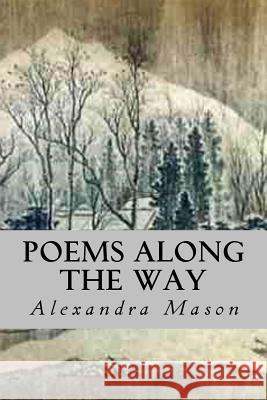Poems Along the Way » książka
Poems Along the Way
ISBN-13: 9780692875360 / Angielski / Miękka / 2017 / 100 str.
"Poems Along the Way" is a collection of fifty-two poems based on works of T'ang Dynasty masters like Li Bai, Wang Wei, and Du Fu. These poems by scholar and writer Alexandra Mason are both homages and creative originals, using the Chinese masters as formal and thematic inspiration. The poems are meditative and serene. Each poem is a portion of the emotional and philosophical process of life's journey along the way. "From moon-shadowed loneliness to wine-soaked friendship, from dreary winter rain to spring orchard joy, these elegant homages bring us closer to the nature, people and philosophy of T'ang dynasty China," says poet Henry Hughes. Matt Schumacher describes the book as "A Taoist treasure chest which frees fleeting flute notes and turtledoves thousands of years old, gives us pause under the 'sturdy huts' of our ancestors, and braves the same mountain summits as the T'ang Dynasty's finest poets. A very old muse moves through these poems, which guide the student toward enduring truths." The volume includes an explanatory essay illustrating the complexities of recreating these ancient poems. "On occasion I re-read Poems Along the Way for the serenity and peace which I gain from them. Though I know little about Taoism, I think it is her deep knowledge that is responsible for the delicacy and beauty with which she endows her interpretations of the poems. There is love and loss, aloneness. There is being the outsider. There is extensive wandering great distances -- not always by one's own desire. I have written about all these things and wish I had their source of patience and calm to assist me -- or this book to help me borrow them. I was yet again impressed with Mason's ability to bridge the gap between two very different languages -- one without grammar, pronoun, punctuation, plural: essentially structureless, and the organization and specificity of English. It is impossible to think of a direct translation from the Chinese symbols, each of which has numerous possibilities. She does it with grace." Shirley A. Plummer Lelia Canfieldon Mason's poetic messages from the T'ang dynasty bring ancient thoughts and feelings to present day immediacy in this sensitive, eminently accessible collection. I call these poems messages rather than translations because the one-to-one meaning trade between words of two different languages that most people consider translation is virtually impossible in poetry. This is even more true when the written form of the two languages differs as radically as do Chinese (with its symbolic characters) and English (with its speech sounds or phonemes): the nuances that shape abstractions into words defy simple correspondences. Yet in Mason's hands, linguistic disparity becomes a delightful asset that moves her to herald each of her Poems Along The Way with distinctive Chinese symbols. To English speakers, these symbols might at first appear only decorative, but a Key to Chinese Characters at the back of the book further enriches experience of each poem. For example, a poem by Wang Wei that Mason titles "At My Mountain Retreat" celebrates the solitary midlife pleasure of treading "the proper path" of self knowledge. When "by chance," the speaker's agreeable solitude is interrupted by "an aging woodsman," both speaker and woodsman end up "forgetting to go home." The Chinese symbol for this charming scenario indicates not the setting (the mountain retreat of the title), nor "the proper path" of self knowledge, but rather, Conversation, an activity that in fact unites and makes continuous the pleasures both of solitude (communing with the self) and companionship (chatting with another). In other words, without the Chinese symbol, we witness two distinct conditions, solitude and companionship; with it, the two become one, as the proper path embraces not only self knowledge in retreat but also chance meetings, chat and laughter, and the mutual forgetting that only retreating would preclude.











